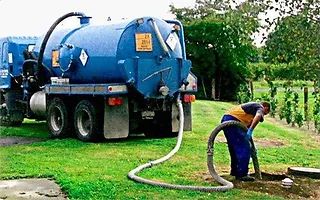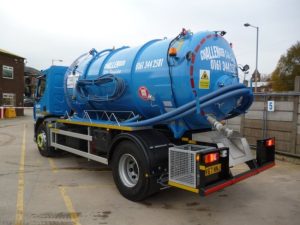Need efficient toilet waste disposal service? Contact us now: 0243174009
Proper waste disposal is a critical aspect of maintaining a clean and healthy living environment. In urban areas like Accra, where population density is high, effective waste management is essential to prevent health hazards and ensure environmental sustainability.
This comprehensive guide delves into the importance of efficient toilet waste disposal, the methods involved, and how you can ensure that your waste disposal practices meet the highest standards.
The Importance of Proper Toilet Waste Disposal

Toilet waste disposal involves the safe and efficient removal and treatment of waste generated by toilets. This process is vital for several reasons:
1. Health and Hygiene
Improper disposal of toilet waste can lead to the spread of diseases. Pathogens present in human waste can contaminate water sources and the surrounding environment, posing significant health risks.
Effective waste disposal practices prevent the spread of infectious diseases, ensuring a healthier community.
2. Environmental Protection
Toilet waste contains harmful chemicals and microorganisms that can pollute the soil and water if not treated properly. Proper disposal helps protect the environment by reducing the risk of contamination and preserving natural resources.
3. Preventing Structural Damage
Accumulated waste can cause blockages and overflows, leading to structural damage to plumbing systems and properties. Regular and efficient disposal prevents such issues, saving homeowners and businesses from costly repairs.
4. Compliance with Regulations
Adhering to local and national regulations regarding waste disposal is crucial. Non-compliance can result in fines and legal issues. Proper toilet waste disposal ensures that you meet all regulatory requirements, avoiding potential penalties.
Methods of Toilet Waste Disposal
Several methods are employed for the disposal of toilet waste, each with its advantages and specific applications. Here are some of the most common methods:
1. Septic Tanks
Septic tanks are commonly used in areas without access to centralized sewage systems. They are buried underground and collect waste from toilets and other household sources.
The waste is partially decomposed by bacteria, and the liquid effluent is drained into a drain field for further treatment by the soil.
Advantages:
- Suitable for rural and suburban areas.
- Low operating costs after installation.
- Environmentally friendly when maintained properly.
Disadvantages:
- Requires regular maintenance and emptying.
- Can cause environmental pollution if not properly managed.
2. Centralized Sewage Systems
In urban areas like Accra, centralized sewage systems are commonly used. Waste is transported through a network of pipes to a treatment plant, where it undergoes various processes to remove contaminants before being discharged into the environment.
Advantages:
- Efficient and effective for large populations.
- Reduces the risk of local contamination.
- Regular maintenance and monitoring by municipal authorities.
Disadvantages:
- High installation and maintenance costs.
- Potential for system failures or overflows if not properly managed.
3. Composting Toilets
Composting toilets are an eco-friendly alternative that uses biological processes to decompose waste into compost. These toilets are particularly useful in areas without access to sewage systems or where water conservation is a priority.
Advantages:
- Environmentally friendly and sustainable.
- Reduces water usage.
- Produces valuable compost for agricultural use.
Disadvantages:
- Requires regular maintenance and management.
- May not be suitable for all climates or settings.
4. Chemical Toilets
Chemical toilets, often seen at construction sites and events, use chemicals to treat and break down waste. These portable units are convenient for temporary use but require proper disposal of the chemical-treated waste.
Advantages:
- Portable and convenient for temporary use.
- Easy to maintain and clean.
Disadvantages:
- Chemicals can be harmful to the environment.
- Not suitable for long-term use.
Best Practices for Toilet Waste Disposal
Ensuring proper toilet waste disposal involves adhering to best practices that promote efficiency, hygiene, and environmental safety. Here are some key practices to follow:
1. Regular Maintenance and Inspection
Regular maintenance of septic tanks and sewage systems is essential to prevent blockages and overflows. Schedule periodic inspections to identify and address any issues promptly.
2. Use of Professional Services
Engaging professional waste disposal services ensures that waste is handled and treated according to industry standards. Professional services have the expertise and equipment to manage waste effectively, reducing the risk of contamination and system failures.
3. Proper Waste Segregation
Avoid disposing of non-biodegradable items, chemicals, and oils in toilets. These materials can cause blockages and interfere with the waste treatment process. Proper waste segregation at the source is crucial for efficient disposal.
4. Water Conservation
Conserving water reduces the volume of waste entering the septic or sewage system, minimizing the risk of overflows and enhancing the efficiency of waste treatment. Install water-efficient fixtures and practice mindful water use.
5. Adhering to Regulations
Familiarize yourself with local regulations regarding waste disposal and ensure compliance. This includes obtaining necessary permits and following prescribed guidelines for waste treatment and disposal.
Also read: Toilet Puller In Accra: Get Reliable Service Today!
The Cost of Toilet Waste Disposal
Understanding the costs associated with toilet waste disposal is important for budgeting and ensuring the sustainability of your waste management practices. Costs can vary based on several factors:
Factors Influencing Costs
- System Type: The type of waste disposal system you use (septic tank, centralized sewage, composting toilet) significantly impacts costs.
- Frequency of Service: Regular maintenance and emptying of septic tanks and other systems incur ongoing costs.
- Location: Costs can vary based on your location, accessibility, and proximity to treatment facilities.
- Service Provider: Different service providers have varying rates. It’s important to compare prices and services to find the best value.
Average Costs
In Accra, the cost of septic tank emptying typically ranges from GHS 500 to GHS 800 per service, depending on the size of the tank and the complexity of the job. Centralized sewage systems incur costs through utility bills, which vary based on usage. Composting toilets have lower ongoing costs but require initial investment and regular maintenance.
Finding Reliable Toilet Waste Disposal Services in Accra
Choosing the right service provider is crucial for effective and affordable toilet waste disposal. Here are some tips for finding reliable services in Accra:
1. Research and Reviews
Look for service providers with positive reviews and a good reputation. Online reviews and recommendations from friends and family can help you identify reliable companies.
2. Experience and Expertise
Choose providers with extensive experience in the industry. Experienced companies are more likely to offer high-quality services and handle waste disposal efficiently.
3. Comprehensive Services
Look for companies that offer a range of services, including inspection, maintenance, and repairs. Comprehensive services ensure that all your waste management needs are met.
4. Transparent Pricing
Ensure that the service provider offers transparent pricing with no hidden fees. Understanding the cost breakdown helps you budget effectively and avoid unexpected expenses.
Why Choose Ghana Residential for Your Toilet Waste Disposal Needs
At Ghana Residential, we understand the importance of maintaining a clean and healthy living environment. Our comprehensive toilet waste disposal services in Accra are designed to meet the unique needs of our clients, ensuring efficient and environmentally responsible waste management.
Our Advantages
- Experienced Team: Our skilled professionals have extensive experience in waste management, ensuring reliable and efficient service.
- Modern Equipment: We use state-of-the-art equipment to handle waste disposal safely and effectively.
- Customer Satisfaction: We prioritize customer satisfaction, offering flexible scheduling and prompt, reliable service.
- Transparent Pricing: Our pricing is competitive and transparent, ensuring you get the best value for your money.
- Comprehensive Solutions: From septic tank emptying to sewage system maintenance, we provide all-encompassing services to keep your property clean and safe.
Conclusion
Effective toilet waste disposal is essential for maintaining a clean, healthy, and environmentally friendly living environment.
By understanding the importance of proper waste disposal, the methods involved, and the costs associated, you can ensure that your waste management practices are efficient and sustainable. Choosing a reliable service provider like Ghana Residential guarantees that your waste disposal needs are met with professionalism and care.
Contact us today to learn more about our services and how we can help maintain the cleanliness and safety of your property.


